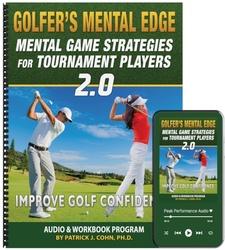
How to Control Your Emotions on the Golf Course
Do you have difficulty controlling your anger during a round of golf?
Have you ever become so angry after a bad shot that you flipped your club to the ground, threw your club or smashed your putter against the ground?
Some golfers get so upset that they just want to walk off the course in the middle of the round.
Intense negative emotions are difficult for some golfers to manage and those runaway emotions can add ten or more strokes to their score over the course of a round.
By far, the most taxing emotion in golf is anger. Anger wears on a golfer mentally and physically.
Anger is emotionally draining and pulls your attention away from playing golf to a world inside your head of negative thoughts, fueling your anger even further.
Surely you can relate to feeling physically exhausted after a round of golf when anger raged inside of you.
For instance, a golfer from our Mental Game of Golf Survey asked for help managing his anger on the course:
“How do I contain my anger and control my emotions? Generally, I find it hard to control my anger. How do I release anger in a constructive way?”
First of all, don’t feel as if you are the only golfer who has a hard time with anger while golfing; it is quite common among golfers in varying degrees.
Several bad shots in a row or tough holes can build your level of frustration. Hitting a wedge from the sand only to watch it roll off the greens can turn that frustration into full blown anger.
Emotional Control
That anger can lead to giving up on focusing and whacking away at the ball with no goal in mind. As you continue to add strokes, you can feel the anger swell inside.
You smash your putter against the ground and bend the shaft. Not only will your score be awful but now you need a new putter. At that point, you have lost control.
While it may feel impossible–in that moment–to control your anger, you definitely can. You may not be able to prevent anger, but you can learn mental strategies to prevent tanking and the bogey train.
You may notice that when you become angry, you retreat into your mind and become overly-critical of every little mistake. Not only are there mental ramifications, physical consequences also become a challenge. When your anger rages, your heart rate becomes elevated and your breathing becomes shallow and rapid.
Golfers speed up their preshot routines when upset. They grab the club and go leaving out the most critical part of the routine.
You can manage your anger in several ways. For example, learning focusing strategies can help turn your attention away from replaying bad shots in your mind and help you focus on hitting the shot right in front of you.
Another way to manage your anger is to learn relaxation strategies to calm your body and thus your mind.
Either way, it is important to realize that you are, ultimately, in the driver’s seat and not your emotions.
Keeping Anger in Check on the Course
Most often, when golfers get upset, they are failing to play up to their expectations, such as “I shouldn’t be 6 over par after 5 holes.”
When you fail to reach your own expectations, that’s when stuff hits the fan and your mind races.
First, you have to manage your preround expectations and not put standards on your game before you tee it up.
Second, write down the top 5 mistakes that make you angry on the golf course. What makes each mistake so awful for you? Write that down as well.
Next, how can you respond differently in each of the same situations? How can you make the mistake OKAY in your mind? The goal is to have a new reaction to the mistake that will help you play on with composure.
Keep in mind a mistake or bad hole does not MAKE you angry, you do!
Related Golf Psychology Articles
- Key to Preparing for Your Next Round of Golf
- How to Change Your Reaction to a Bad Shot
- Tips to Manage Emotions on the Golf Course
- Subscribe to The Golf Psychology Podcast on iTunes
- Subscribe to The Golf Psychology Podcast on Spotify
Golfer’s Mental Edge 2.0

Do you suffer from fragile self-confidence after missed hitting shots or making mistakes, playing with strict or high expectations that undermine confidence, or the inability to play freely and relaxed on the course?
Successful golfers have learned how to perform with ultimate confidence in competition, so we’ve developed The Golfer’s Mental Edge 2.0 Workbook and Audio program to help you do this!
The Golfer’s Mental Edge 2.0 program includes the top 11 mental training sessions I do with my personal students to help them boost their mental game and improve consistency on the course!